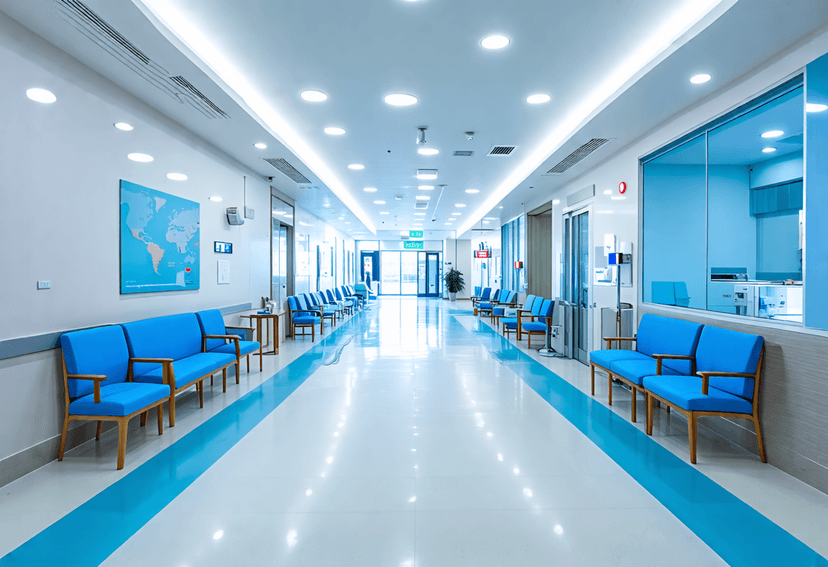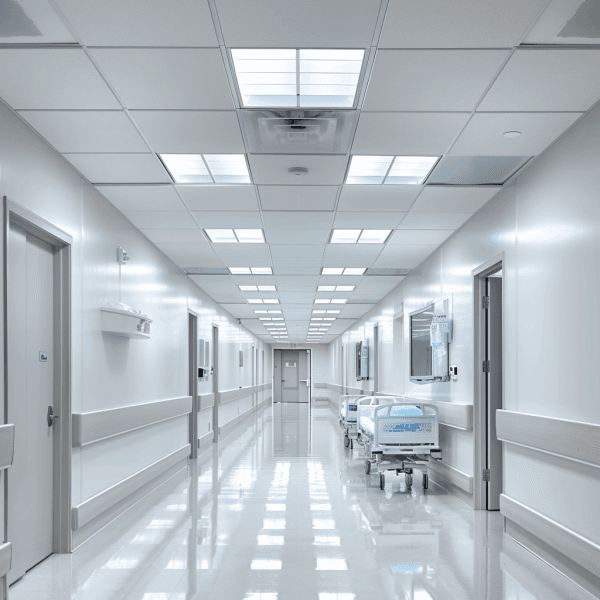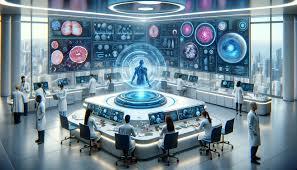
How Precision Medicine is Changing Cancer Treatment in the UAE
17 Jul, 2024
 Healthtrip Team
Healthtrip TeamIn recent years, cancer treatment in the UAE has seen remarkable advancements, thanks to precision medicine. This approach marks a significant departure from traditional methods that use generalized treatments for all patients. Instead, precision medicine tailors treatment plans to fit each patient's unique genetic, environmental, and lifestyle factors.
Most popular procedures in India
What is Precision Medicine?
Precision medicine is an approach to healthcare that takes into account individual differences in genes, environment, and lifestyle for each person. It allows doctors and researchers to predict more accurately which treatment and prevention strategies will work best for a particular disease, considering the patient's genetic makeup, biomarkers, and other factors. This approach contrasts with a one-size-fits-all approach, where treatments and interventions are developed for the average person, often leading to varied outcomes.
Wellness Treatments
Give yourself the time to relax
Lowest Prices Guaranteed!

Lowest Prices Guaranteed!
Imagine two patients diagnosed with the same type of cancer. In traditional medicine, both patients might receive the same standard chemotherapy regimen. However, with precision medicine:
1. Genetic Testing: Each patient's tumour is analyzed through genetic testing to identify specific mutations or biomarkers.
2. Targeted Therapy: Based on the genetic profile of the tumour, Patient A might have a mutation that responds well to a targeted therapy drug that inhibits that specific mutation. This personalized treatment can potentially lead to better outcomes with fewer side effects.
3. Immunotherapy: Patient B, whose tumour doesn't have the mutation targeted by the drug used for Patient A, might benefit more from immunotherapy that enhances their immune system to fight cancer cells effectively.
Precision medicine thus tailors treatments to the genetic, environmental, and lifestyle characteristics of individual patients, aiming for more effective and personalized care.
How does precision medicine differ from traditional medicine?
Precision medicine differs from traditional medicine in how it customizes healthcare:
1. Individualized Approach: Precision medicine considers each person's unique genetic makeup, environment, and lifestyle factors to tailor treatment and prevention strategies. Traditional medicine often uses standard treatments that may not account for individual variability.
2. Targeted Treatments: In precision medicine, treatments are selected based on genetic testing and biomarker analysis, aiming to match therapies specifically to the patient's disease characteristics. Traditional medicine typically applies one-size-fits-all approaches without detailed molecular insights.
3. Enhanced Treatment Efficacy: By pinpointing genetic mutations or biomarkers, precision medicine aims to improve treatment outcomes by increasing the likelihood of therapeutic success and reducing adverse effects compared to broad-spectrum treatments in traditional medicine.
4. Personalized Care: Precision medicine enables healthcare providers to offer more personalized care plans, optimizing treatment effectiveness and patient outcomes based on detailed genetic and molecular profiles. Traditional medicine often relies on empirical evidence and population-based guidelines.
In essence, precision medicine represents a shift towards more targeted, individualized healthcare that leverages genetic and molecular insights to optimize patient care and outcomes.
The Role of Genetic Testing
Genetic testing plays a crucial role in various aspects of healthcare, particularly in the context of precision medicine. Here’s how it contributes:
1. Diagnosis and Risk Assessment: Genetic testing helps in diagnosing genetic disorders, predicting the risk of developing certain diseases (like hereditary cancers), and identifying carriers of genetic mutations that can be passed on to offspring.
'
2. Personalized Treatment: In precision medicine, genetic testing guides treatment decisions by identifying specific genetic mutations in tumours or individuals. This allows for targeted therapies that are tailored to the genetic makeup of the patient, potentially improving treatment efficacy and minimizing side effects.
3. Pharmacogenomics: Genetic testing can predict how individuals will respond to certain medications based on their genetic variations. This field, known as pharmacogenomics, helps optimize drug selection and dosage for personalized treatment plans.
4. Family Planning: Genetic testing provides valuable information for family planning decisions, allowing individuals to make informed choices about reproductive options and prenatal testing.
5. Research and Development: Genetic testing contributes to advancing medical research by identifying new genetic targets for therapies, understanding disease mechanisms, and developing innovative treatments.
Genetic testing empowers healthcare providers and patients with personalized information that enhances diagnosis, treatment selection, and disease prevention strategies.
How Targeted Therapies Make a Difference
Targeted therapies are a category of cancer treatment that focuses on specific molecular targets involved in the growth and survival of cancer cells. Here’s how they make a difference:
1. Precision Targeting: Unlike traditional chemotherapy, which affects both cancerous and healthy cells, targeted therapies specifically target cancer cells by interfering with specific molecules or pathways crucial for tumour growth and progression.
2. Personalized Treatment: Targeted therapies are often selected based on genetic testing and biomarker analysis of the tumour. This personalized approach helps match patients with treatments that are more likely to be effective for their specific cancer type and genetic profile.
3. Reduced Side Effects: By targeting specific molecular changes in cancer cells, targeted therapies can potentially cause fewer side effects compared to traditional chemotherapy, which can impact healthy cells as well.
4. Improved Treatment Outcomes: Some patients respond well to targeted therapies, experiencing tumour shrinkage or slowed growth. This can lead to longer periods of disease control and improved quality of life compared to standard treatments.
5. Combination Therapies: Targeted therapies can be used in combination with other treatments like chemotherapy, radiation therapy, or immunotherapy to enhance effectiveness and address different aspects of cancer growth and resistance.
Overall, targeted therapies represent a significant advancement in cancer treatment, offering more precise and effective options tailored to individual patients, potentially leading to better outcomes and improved survival rates.
What are the benefits of precision medicine for patients?
1. Personalized Treatment Plans
Imagine you're diagnosed with lung cancer. Instead of a standard chemotherapy regimen that may have varying effects on different patients, precision medicine allows doctors to analyze your tumour's genetic makeup. They can pinpoint specific mutations driving the cancer's growth. For instance, if your tumour has a mutation in the EGFR gene, which is common in non-small cell lung cancer, doctors can prescribe targeted therapies like Erlotinib or Osimertinib. These drugs specifically inhibit the activity of mutated EGFR proteins, effectively blocking cancer cell growth while sparing healthy cells.
2. Improved Treatment Efficacy
Precision medicine increases the likelihood of treatment success by targeting the molecular abnormalities unique to each patient's cancer. This approach often leads to better response rates and longer periods of disease control. For example, in breast cancer, HER2-positive tumours can be effectively treated with targeted therapies such as Trastuzumab (Herceptin). By specifically targeting HER2 receptors on cancer cells, Herceptin disrupts their growth signals, resulting in significant improvements in patient outcomes.
3. Reduced Side Effects
Traditional cancer treatments like chemotherapy can cause severe side effects due to their broad impact on rapidly dividing cells, affecting both cancerous and healthy tissues. In contrast, targeted therapies in precision medicine are designed to selectively attack cancer cells based on their molecular characteristics. This specificity minimizes damage to healthy tissues, leading to fewer and milder side effects. Patients often experience less nausea, hair loss, and fatigue, enhancing their overall quality of life during treatment.
4. Facilitates Early Detection and Prevention Strategies
Precision medicine isn't just about treatment; it also plays a crucial role in early detection and prevention. Genetic screening can identify individuals at higher risk of developing certain types of cancer due to inherited genetic mutations, such as BRCA1 and BRCA2 in breast cancer. With this knowledge, doctors can implement personalized screening protocols and preventive measures to detect cancer at its earliest stages or even prevent its occurrence altogether through lifestyle modifications or prophylactic surgeries.
5. Tailored Follow-up Care
After treatment, precision medicine continues to benefit patients by guiding personalized follow-up care plans. Monitoring for disease recurrence or treatment effectiveness can be customized based on individual genetic profiles and treatment responses. This proactive approach ensures that patients receive ongoing support and interventions tailored to their specific needs, improving long-term outcomes and survivorship rates.
Leading Hospitals Embracing Precision Medicine in the UAE
Several hospitals in the UAE have embraced precision medicine as part of their comprehensive cancer care programs:
- Established Year: 2008
- Location: 37 26th St - Umm Hurair 2 - Dubai Healthcare City, Dubai, United Arab Emirates
About The Hospital
- Mediclinic City Hospital is a state-of-the-art healthcare facility. It is equipped with the latest technology and staffed by highly trained professionals.
- Number of Beds: 280
- Number of Surgeons: 3
- The hospital boasts 80 doctors and over 30 specialists.
- Neonatal Beds: 27
- Operating Rooms: 6, plus 3 daycare surgery units, 1 C-section OT
- Cardiac Catheterisation Laboratories: 2
- Endoscopy suites, fully equipped laboratory, emergency department, labour and post-natal wards.
- Advanced Medical Technology: PET/CT, SPECT CT, and 3T MRI.
- The hospital offers specialist-focused treatment in areas such as cardiology, radiology, gynaecology, trauma, nuclear medicine, endocrinology, and more.
- Mediclinic City Hospital offers specialities in Urology, Neurology, Gynaecology, General Surgery, Gastroenterology, E.N.T, Dermatology, Cardiology, Oncology, Orthopedics, Ophthalmology, Bariatric Surgery, Paediatric Neurology, Paediatric Oncology, and Paediatric Orthopaedics, staffed by top doctors in each field.
2. Burjeel Medical City, Abu Dhabi
- Established Year: 2012
- Location: 28th St - Mohamed Bin Zayed City - Abu Dhabi - United Arab Emirates, United Arab Emirates
About The Hospital:
- Total Number of Beds: 180ICU Beds: 31 (Including 13 Neonatal ICU and 18 Adult ICU Beds)
- Labour and Delivery Suites: 8
- Operation Theatres: 10 (Including 1 state-of-the-art Hybrid OR)
- Day Care Beds: 42
- Dialysis Beds: 13
- Endoscopy Beds: 4
- IVF Beds: 5
- OR Day Care Beds: 20
- Emergency Beds: 22
- Individual Patient Rooms: 135
- 1.5 & 3.0 Tesla MRI and 64-slice CT scan
- Luxury Suites: Royal Suites: 6000 sq. ft. each
- Presidential Suites: 3000 sq. ft.
- Majestic Suites
- Executive Suites
- Premier & Deluxe Rooms
- Designed to be a hub for tertiary and quaternary oncology treatment.
- Specializes in adult and pediatric subspecialties, long-term, and palliative care.
- Offers immunotherapy and molecularly targeted therapies.
- Provides state-of-the-art diagnosis and compassionate treatment.
- Offers exceptional support services for patients and their families.
- Burjeel Medical City in Abu Dhabi offers advanced care and expertise in cardiology, paediatrics, ophthalmology, oncology, IVF, gynaecology & obstetrics, orthopaedics & sports medicine, a dedicated Shoulder and Upper Limb Unit, Burjeel Vascular Centre, and bariatric & metabolic surgery. This state-of-the-art hospital provides comprehensive, top-quality healthcare services to patients, ensuring their unique medical needs are met with the highest level of care and expertise. Burjeel Medical City is committed to providing high-quality medical care in a comfortable and technologically advanced environment.
The Future of Precision Medicine in Improving Cancer Survival Rates:
1. Advancements in Genomic Technologies: Continued advancements in next-generation sequencing and bioinformatics will enhance our ability to identify new genetic targets and biomarkers for precision therapies. This will lead to more effective treatments tailored to individual genetic profiles, potentially improving overall survival rates.
2. Integration of AI and Machine Learning: AI algorithms will analyze vast datasets to predict treatment responses and identify patterns in cancer genomics. AI-driven insights will aid oncologists in making data-driven decisions for personalized treatment strategies and optimizing outcomes.
3. Combination Therapies and Immunotherapy: Precision medicine will increasingly combine targeted therapies with immunotherapy and other treatment modalities. This multimodal approach will enhance the immune system's ability to target cancer cells, potentially leading to better long-term survival and remission rates.
4. Patient-Centred Research and Clinical Trials: Focus on patient-centred research will expand clinical trials investigating personalized treatment approaches. More patients will benefit from access to cutting-edge therapies tailored to their specific genetic and molecular profiles, improving survival outcomes.
5. Global Collaboration and Accessibility: Efforts to reduce costs, improve accessibility, and standardize genomic testing and therapies globally. Enhanced accessibility will ensure that all patients, regardless of location or economic status, can benefit from precision medicine approaches, ultimately improving global cancer survival rates.
How can HealthTrip assist with your treatment?
If you're seeking Treatment in UAE, let HealthTrip be your compass. We support you throughout your medical journey with the following:
- Access to top doctors in 38+ countries and the largest health travel platform.
- Partnerships with 1500+ hospitals, including Fortis, Medanta, and more.
- Treatments in neuro, cardiac care, transplants, aesthetics, and wellness.
- Post-treatment care and assistance.
- Teleconsultations with leading doctors at $1/minute.
- Over 61K patients served.
- Access Top treatments and packages, such as Angiograms and many more.
- Gain insights from genuine patient experiences and testimonials.
- Stay updated with our medical blog.
- 24/7 unwavering support, from hospital formalities to travel arrangements or emergencies.
Hear from our satisfied patients
Precision medicine is revolutionizing cancer treatment in the UAE by offering personalized care tailored to each patient's genetic and lifestyle factors. This approach leads to more effective treatments with fewer side effects, improving patient outcomes. Leading hospitals like Mediclinic City Hospital and Burjeel Medical City are at the forefront of this innovation. As technology advances, precision medicine promises a brighter future for cancer care, enhancing patients' survival rates and quality of life.
Related Blogs

Unparalleled Medical Care at Burjeel Medical City, Abu Dhabi
Experience the best of medical care and hospitality at Burjeel

Top Hospitals for Bone Marrow Transplant in UAE
When facing the challenging journey of a bone marrow transplant,

Top Hospitals for Hormone Therapy in Cancer Treatment in UAE
Hormone therapy has become a cornerstone in the treatment of

AI-Enhanced Pathology: Transforming Cancer Diagnosis in UAE
Cancer diagnosis has traditionally depended on pathologists manually examining tissue

How AI & ML Are Transforming Diagnostics in UAE Hospitals?
The healthcare landscape is undergoing a seismic shift with the

Dubai’s Top Eye Care Hospitals
Let’s face it—life in Dubai moves fast, and eye health











